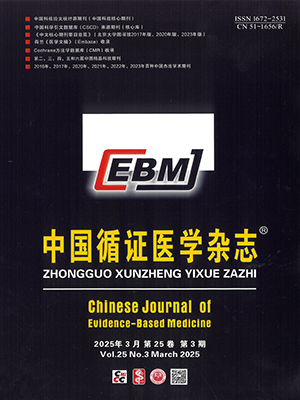| 1. |
Murray CJ, Vos T, Lozano R, et al. Global and regional burden of stroke during 1990-2010:findings from the Global Burden of Disease Study 2010. Lancet, 2012, 380(9859):2197-2223.
|
| 2. |
Yang G, Wang Y, Zeng Y, et al. Rapid health transition in China, 1990-2010:findings from the Global Burden of Disease Study 2010. Lancet, 2013, 381(9882):1987-2015.
|
| 3. |
Liao XL, Wang CX, Wang YL, et al. Implementation and outcome of thrombolysis with alteplase 3 to 4.5 h after acute stroke in Chinese patients. CNS Neurosci Ther, 2013, 19(1):43-47.
|
| 4. |
Turk A, Magarik JA, Chaudry I, et al. CT perfusion-guided patient selection for endovascular treatment of acute ischemic stroke is safe and effective. J Neurointerv Surg, 2012, 4(4):261-265.
|
| 5. |
Sztriha LK, Manawadu D, Jarosz J, et al. Safety and clinical outcome of thrombolysis in ischaemic stroke using a perfusion CT mismatch between 3 and 6 hours. PLoS One, 2011, 6(10):e25796.
|
| 6. |
García-Bermejo P, Calleja AI, Pérez-Fernández S, et al. Perfusion computed tomography-guided intravenous thrombolysis for acute ischemic stroke beyond 4.5 hours:a case-control study. Cerebrovasc Dis, 2012, 34(1):31-37.
|
| 7. |
中华医学会神经病学分会脑血管病学组急性缺血性脑卒中诊治指南撰写组.中国急性缺血性脑卒中诊治指南2010.中国全科医学, 2011, 14(12B):4013-4017.
|
| 8. |
Earnshaw SR, McDade C, Chapman AM, et al. Economic impact of using additional diagnostic tests to better select patients with stroke for intravenous thrombolysis in the United Kingdom. Clin Ther, 2012, 34(7):1544-1558.
|
| 9. |
Jackson D, Earnshaw SR, Farkouh R, et al. Cost-effectiveness of CT perfusion for selecting patients for intravenous thrombolysis:a US hospital perspective. AJNR Am J Neuroradiol, 2010, 31(9):1669-1674.
|
| 10. |
Liao XL, Wang CX, Wang YL, et al. Implementation and Outcome of Thrombolysis with Alteplase 3 to 4.5h After Acute Stroke in Chinese Patients. CNS Neuroscience & Therapeutics, 2013, 19(1):43-47.
|
| 11. |
Chen C, Ye M, Chen BL, et al. Thrombolysis on ischemic stroke patients with decreased level of consciousness within 4.5 h. CNS Neuroscience & Therapeutics, 2013, 19(1):48-52.
|
| 12. |
Hacke W, Donnan G, Fieschi C, et al. Association of outcome with early stroke treatment:pooled analysis of ATLANTIS, ECASS, and NINDS rt-PA stroke trials. Lancet, 2004, 363(9411):768-774.
|
| 13. |
Schellinger PD, Thomalla G, Fiehler J, et al. MRI-based and CTbased thrombolytic therapy in acute stroke within and beyond established time windows:an analysis of 1210 patients. Stroke, 2007, 38(10):2640-2645.
|
| 14. |
Wei JW, Arima H, Huang Y, et al. Variation in the Frequency of Intracerebral Haemorrhage and Ischaemic Stroke in China:A National, Multicentre, Hospital Register Study. Cerebrovasc Dis Extra, 2010, 29(4):321-327.
|
| 15. |
Wei JW, Huang Y, Wang JG, et al. Current management of intracerebral haemorrhage in China:a national, multi-centre, hospital register study. BMC Neurol, 2011, 11:16.
|
| 16. |
Cohnen M, Wittsack HJ, Assadi S, et al. Radiation exposure of patients in comprehensive computed tomography of the head in acute stroke. AJNR Am J Neuroradiol, 2006, 27(8):1741-1745.
|
| 17. |
Diekmann S, Siebert E, Juran R, et al. Dose exposure of patients undergoing comprehensive stroke imaging by multidetector-row CT: comparison of 320-detector row and 64-detector row CT scanners. AJNR Am J Neuroradiol, 2010, 31(6):1003-1009.
|
| 18. |
Yamauchi-Kawara C, Fujii K, Aoyama T, et al. Radiation dose evaluation in multidetector-row CT imaging for acute stroke with an anthropomorphic phantom. Br J Radiol, 2010, 83(996):1029-1041.
|
| 19. |
Mnyusiwalla A, Aviv RI, Symons SP. Radiation dose from multidetector row CT imaging for acute stroke. Neuroradiology, 2009, 51(10):635-640.
|
| 20. |
Hoeffner EG, Case I, Jain R, et al. Cerebral Perfusion CT:Technique and Clinical Applications. Radiology, 2004, 231(3):632-644.
|
| 21. |
暴婧, 吴巍珍, 杜湘柯, 等.计算机体层摄影检查中对比剂肾病的流行病学研究.中国血液净化, 2011, 10(8):416-420.
|
| 22. |
Darby DG, Barber PA, Gerraty RP, et al. Pathophysiological topography of acute ischemia by combined diffusion-weighted and perfusion MRI. Stroke, 1999, 30(10):2043-2052.
|
| 23. |
Wintermark M, Flanders AE, Velthuis B, et al. Perfusion-CT assessment of infarct core and penumbra:receiver operating characteristic curve analysis in 130 patients suspected of acute hemispheric stroke. Stroke, 2006, 37(4):979-985.
|
| 24. |
张茁, 张微微, 毕齐, 等. 2270例卒中患者延误诊治时间的因素分析.中国脑血管病杂志, 2005, 2(2):62-64.
|
| 25. |
王伊龙, 吴敌, 周永, 等.中国七城市卒中患者急诊溶栓情况分析.中国卒中杂志, 2009, 4(1):23-28.
|
| 26. |
Wei JW, Heeley EL, Jan S, et al. Variations and determinants of hospital costs for acute stroke in China. PLoS One, 2010, 5(9):e13041.
|
| 27. |
刘国恩, 刘国恩, 张玉哲, 等.急性缺血性脑卒中三种常用神经保护药物成本-效果分析.中国卫生经济, 2012, 31(8):62-65.
|
| 28. |
张兴文.缺血性脑卒中直接医疗成本及其与预后关系研究.北京:中国协和医科大学, 2008.
|
| 29. |
Samsa GP, Reutter RA, Parmigiani G, et al. Performing costeffectiveness analysis by integrating randomized trial data with a comprehensive decision model:application to treatment of acute ischemic stroke. J Clin Epidemiol, 1999, 52(3):259-271.
|
| 30. |
Liao XL, Wang CX, Wang YL, et al. Implementation and outcome of thrombolysis with alteplase 3 to 4.5 h after acute stroke in Chinese patients. CNS Neurosci Ther, 2013, 19(1):43-47.
|
| 31. |
Nagakane Y, Christensen S, Brekenfeld C, et al. EPITHET:Positive result after reanalysis using baseline diffusion-weighted imaging/ perfusion-weighted imaging co-registration. Stroke, 2011, 42(1):59-64.
|




